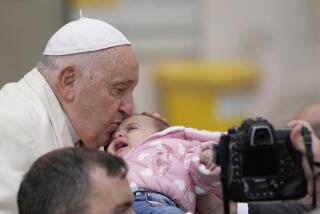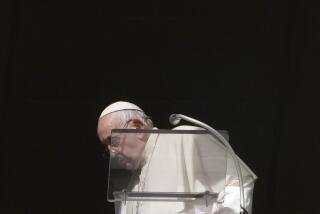Clerics Say Religion No Basis for Terror
- Share via
ROME — Leading Christian and Muslim clerics, meeting here to debate the fallout of last month’s attacks on the United States, have rejected the use of religion to justify terrorism and urged followers to search for peace through understanding.
But after two days of heated discussion that vented anti-American feelings, the appeal from the so-called Islamic-Christian Summit stopped short of condemning the Sept. 11 slaughter at the Pentagon and World Trade Center.
Sant’Egidio, a Roman Catholic lay group that mediates international conflicts, hoped to elicit a joint Muslim-Christian rebuke of the attacks, which the Bush administration has blamed on Osama bin Laden, an Islamic fundamentalist who has declared holy war on the United States and its allies.
However, Islamic clerics insisted on broadening the condemnation to what they call other forms of terrorism--Israel’s treatment of Palestinians and the deprivations of Iraqis under U.S.-led international sanctions.
Delegates said they were stymied by the debate and decided to avoid any references to specific acts of terror.
“The Islamic community wanted the document to say something about Palestine, but that wasn’t something everybody could agree with,” George Freeman, general secretary of the World Methodist Council, said Friday as he and other delegates headed home. “That’s a wider issue than what the summit was called for.”
The appeal for peace, read to 3,000 people at a candlelight ceremony late Thursday, demanded that “no one use the name of God to take the life of an innocent victim.”
“Whoever uses the name of God to hate and choose the way of violence abandons pure religion,” it added. “To speak of religious war is an absurdity.”
Andrea Riccardi, the founder of Sant’Egidio and organizer of the meeting, acknowledged the clashing views that were behind the statement.
“One declaration cannot change everything,” he said. “We are in the heart of a long-term process of understanding.”
Nasr Farid Wassel, who is grand mufti of Egypt, and 11 other Muslim clerics, theologians, philosophers and jurists of Islamic law took part in the meeting. Seven Roman Catholic cardinals were among 19 Christian delegates, who also included Orthodox, Lutheran, Methodist and Episcopal leaders.
The Muslim participants--from Egypt, Iran, Saudi Arabia, the Persian Gulf States and the United States--are moderates within the Islamic world. But some used the meeting to attack the U.S. and Israeli policies.
“America has contributed to many terrorist acts in the world: Vietnam . . . the continuous support for Israel against the Palestinian people,” said Mohammed Said Noamani of Iran’s Organization of Culture and Islamic Relations. “For that reason, America cannot be the champion of the struggle against terrorism in the world.”
One thing that united Christians and Muslims at the summit was rejection of Italian Prime Minister Silvio Berlusconi’s recent assertion of the superiority of Western civilization.
“The terrorists must be identified and disarmed, but that cannot be done if an entire culture, religion or nation is held responsible,” said Cardinal Carlo Maria Martini, archbishop of Milan.
Freeman, whose North Carolina-based council represents Methodist denominations in 132 countries, said he was “puzzled” by the summit’s failure to condemn the attacks on America but was leaving Rome “with a good feeling that we have spoken to each other about what Islam is.”
“There’s a lot of ignorance about that in the United States,” he added. “Some people have equated Islam with terrorism. We need to do a lot of education to communicate that this is not the case.”
More to Read
Sign up for Essential California
The most important California stories and recommendations in your inbox every morning.
You may occasionally receive promotional content from the Los Angeles Times.












